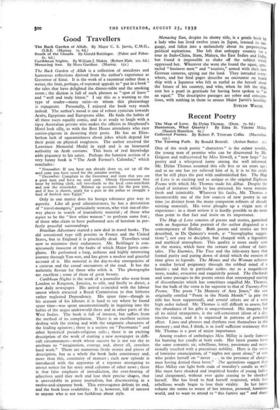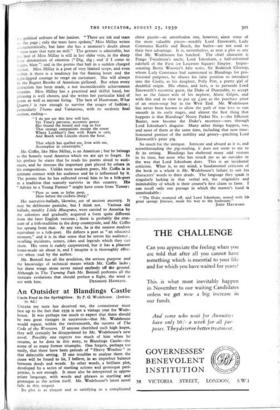Recent Poetry
The Turning Path. By Ronald Bottrall. (Arthur Barker. 5s.) ONE of the stock poetic " characters " is the enfant terrible, the young man of promise who can be discovered by Mr. Grigson and rediscovered by Miss Sitwell, a " new hope " for poetry and a whispered name among the well informed.
Mr. Dylan Thomas assumed this role five or six years ago ; and as no one has yet relieved him of it, it is to his credit that he still plays the part with undiminished fire. The Map of Love is as exciting and as unique as the original Eighteen Poems with which Mr. Thomas made his debut. Despite the cloud of imitators which he has attracted, his verse remains fresh and inimitable. Whatever his faults, Mr. Thomas is
incontestably one of the few sources of new poetry in our time (as distinct from the many competent refiners of already existing material). His verse ploughs up a virgin acre of experience : in a short review it is hardly possible to do more than point to that fact and insist on its importance.
The Map of Love consists of poems and stories, garnished with an Augustus John portrait of the author disguised as a contemporary of Shelley. Both poems and stories are best described, in De Quincey's words, as " hieroglyphic sugges- tions "; not easy to decipher, but charged with a legendary and mythical atmosphere. This quality is more easily seen in the stories, which have the texture and colour of fairy- tales. The Enemies, The Tree and the title-story have that formal purity and paring down of detail which the erosion of time gives to legends. The Mouse and the Woman achieves a similar lyrical poignancy through the robbed mind of a lunatic ; and this in particular strikes me as a magnificent story, tender, evocative and exquisitely poised. The Orchards and some passages in the poems retain that stereotyped mating of discordancies which has sometimes engulfed Mr. Thomas, but the bulk of the verse is far superior to that of Twenty-Five Poems. The poem " In Memory of Ann Jones," the one originally entitled " Poem in the Ninth Month " (a pity the title has been suppressed), and several others are of a very high order indeed. Mr. Thomas is still difficult to assess, but the abundance of his gifts is unquestioned. His imagery, for all its initial strangeness, is the self-consistent idiom of a dis- tinctive vision, and it is organised in patterns of powerful effect. Lines and phrases and rhythms root themselves in the memory ; and that, I think, is in itself sufficient testimony that
Mr. Thomas is a poet of major importance.
Among readers of anthologies Miss Millay is justly famous for burning her candle at both ends. Her latest poems have the same romantic air, rebellious, bitter, passionate and occa- sionally touched with a precarious nobility. Hers is the voice of feminine emancipation, of " nights not spent alone," of one who prides herself on " never . . . in the presence of clergy- men having denied these loves." The quotations suggest that Miss Millay can light both ends of morality's candle as well. She must have shocked and inspirited hordes of young ladies (and clergymen), without ever quite ceasing to be shocked herself. She has lived to find herself respected; while her rebellious words begin to lose their vitality. In her latest volume she seems to weary of her intense, personal, feminine
world, and to want to attend to " this furtive age "
and share
t political ardours of her juniors. " There are ink and tears
r, the page ; only the tears have spoken," Miss Millay writes thiracteristically, but later she has a moment's doubt about :hese tears that turn no mill." The gesture is admirable, but the best of Miss Millay is still in her older vein, in the sharp
1;::le detonations of emotion ("Dig, dig ; and if I come to 1,..,iges, blast ") and in the poems that halt in a sudden charged lience. Miss Millay is a poet of very limited scope, and even
.,k,thin it there is a tendency for the flaming heart and the n :ht-lipped courage to verge on caricature. She will always be the Rupert Brooke of American girlhood. But when every detraction has been made, a not inconsiderable achievement remains. Miss Millay has a practised and skilful hand, her phrasing is well chosen, and she writes her particular kind of poem as well as anyone living. The best of Huntsman, What Quarry? is rare enough to survive the usages of fashion ; particularly Theme and Variations, with its sardonic final
section, ending- " I do not say this love will last;
Yet Time's perverse, eccentric power Has bound the hound and stag so fast That strange companions mount the tower Where Lockhart's fate with Keats is cast, And Booth with Lincoln shares the hour.
That which has quelled me, lives with me, Accomplice in catastrophe."
Mr. Coffin, like Miss Millay, is an American ; but he belongs to the homely rural America which we are apt to forget. In his preface he states that he reads his poems aloud to audi- ences, and he stresses the important part played by others in his compositions. Unlike most modern poets, Mr. Coffin is in intimate contact with his audience and he is influenced by it. The poems that he has collected reveal him to be a folk-poet in a tradition that scarcely survives in this country. His " Advice to a Young Farmer " might have come from Tusser t "Plow as soon as hylas peep, Mow before the crickets cheep."
His narrative-ballads, likewise, are of ancient ancestry. It may be deliberate pastiche, but I think not. Various old ballads, notably Little Musgrave, were carried to America by the colonists and gradually acquired a form quite different from the later English versions ; there is probably the rem- nant of a folk-tradition in the deep countryside, and Mr. Coffin has sprung from that. At any rate, he is the nearest modern equivalent to a folk-poet. He defines a poet as " an educated memory," and it is in that sense that he serves his audience , recalling incidents, scenes, jokes and legends which they can share. His verse is rudely carpentered, but it has a pleasant home-made air about it, and I imagine it is thoroughly effec-
tive when :ead by the author.
Mr. Bottrall has all the erudition, the serious purpose and the knowledge of technical means which Mr. Coffin lacks ; but these wings alone never raised anybody off the ground. Although in The Turning Path Mr. Bottrall performs all the
intricate evolutions that should preface a flight, the wind is









































 Previous page
Previous page